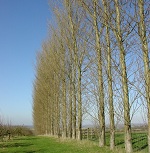 The large-scale production of biofuels in Europe could result in increased human mortality and crop losses, according to research by experts at Lancaster University's Environment Centre. The study, Impacts of biofuel cultivation on mortality and crop yields, was carried out by Prof Nick Hewitt, Dr Oliver Wild and former PhD student Kirsti Ashworth and has been published online in the journal Nature Climate Change.
The large-scale production of biofuels in Europe could result in increased human mortality and crop losses, according to research by experts at Lancaster University's Environment Centre. The study, Impacts of biofuel cultivation on mortality and crop yields, was carried out by Prof Nick Hewitt, Dr Oliver Wild and former PhD student Kirsti Ashworth and has been published online in the journal Nature Climate Change.
Biofuels are usually derived from specialist crops such as poplar, willow or eucalyptus and constitute one of the alternative energy sources being advocated as more sustainable alternatives to fossil fuels. However, many plant species grown for biofuel emit more isoprene – an ozone precursor – than the traditional crops they replace. Isoprene then takes part in chemical reactions in the lower atmosphere that lead to the formation of ozone.
The modelling case study estimated the increase in ground level ozone pollution likely to result from a change to biofuel crops and the associated impacts on human health and agricultural production. The model involved the conversion of enough land area in Europe to meet the EU's 2020 goal for biofuel production to short rotation coppice crops and estimated the effects on human mortality and crop productivity.
Said Prof Hewitt: "Growing biofuels is thought to be a good thing because it reduces the net amount of carbon dioxide emitted to the atmosphere, but biofuels could also have a detrimental effect on air quality. Large-scale production of biofuels in Europe would have small but significant effects on human mortality and crop yields."
He later explained, in an interview with the public sector newsletter Science Omega, how ground-level ozone affects people and plants.
"It causes damage both to plants and to the human respiratory system. Essentially, ozone reduces the productivity of crops and is potentially fatal in humans. The World Health Organization (WHO) estimates that approximately 22,000 Europeans die every year because of ozone pollution."
Asked whether that meant biofuel are not a viable energy solution, he replied: "We are not saying that at all. We are simply pointing out that, when assessing biofuel cultivation, policymakers must account for detrimental effects to air quality as well as for climate-related benefits. Whether or not [large-scale biofuel production] is viable is a political decision."
He went on to explain that there are ways of ameliorating those effects, including planting the trees in areas with low levels of the oxides of nitrogen. Another, which is already in development in Germany, is to genetically engineer trees that don't produce isoprene.
Picture of poplar trees © Dave Bushell, from Geograph